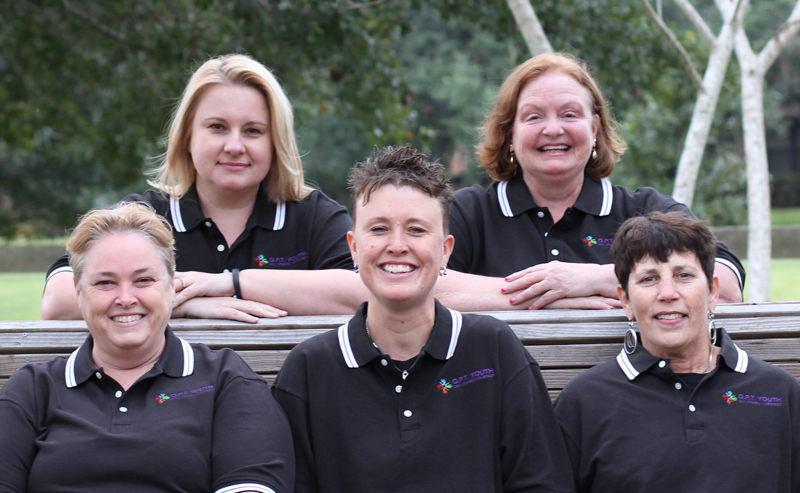
Out, Proud, Together: Mentoring Houston’s LGBT Teens
By David Goldberg
The surge of positive media coverage about LGBT political progress over the last few years may be giving a false impression that the future is safe for queer youth. Recent statistics reveal that the cards are stacked against our next generation: 26 percent of LGBT teens are forced out of their homes, 28 percent drop out of school to avoid bullying, and LGBT teenagers are two to three times more likely to attempt suicide than their peers. The situation for isolated and defenseless youth has not yet gotten better.
Pat Golmon, founder of O.P.T. YOUTH (Out. Proud. Together.), a brand-new mentoring service for LGBT teens in Houston, argues that while the cultural landscape has made coming out easier, it hasn’t necessarily helped gay teens with what comes next. “It’s a blessing and a curse that kids feel more comfortable coming out,” Golmon says. “But the bullying is going to happen. You feel comfortable coming out, and all of a sudden you hit a brick wall. And even if you have parents that are very supportive, they still have no idea what you’re going through.”
To its credit, Houston has an arsenal of organizations that provide aid to LGBT teens. In addition to PFLAG and HATCH (both of which are flourishing after decades in the community), O.P.T. is hoping to provide a consistent means of support for LGBT youth through yearlong mentorships for teens aged 12 to 19.
O.P.T. looks to fill the service gap that HATCH, PFLAG, and other mentoring organizations can’t cover. HATCH participants need a ride to get to events, and PFLAG is family- and parent-oriented. O.P.T. looks to provide even more direct service. Golmon and her board believe that their in-depth mentoring will complement the work of their peer organizations. “The other organizations have been tremendously helpful to us, and have proven that they’re open to another program being in the mix,” says Dr. Susan Hardesty, O.P.T. treasurer. “They recognize that we serve different purposes.”
Thanks to the support of friends and community members via a GoFundMe campaign, along with the assistance of regular donors, O.P.T. is ready to start training mentors and connecting them with teenagers. To make a name for themselves, Golmon’s team has been appearing at community events, and the O.P.T. leadership is reaching out to HISD counselors to identify participants.
But how do you cater to the specific needs of LGBT youth in a city as vastly diverse as Houston? “We have an environment where different cultures have very different views and understandings about homosexuality,” Hardesty says. She believes that the more mentors O.P.T. recruits, the better equipped it will be to address youth of varying backgrounds, religions, and demographics.
As for the mentors themselves, they must be over 24 years old. Although they are put through exhaustive screenings, background checks, and at least eight hours of training, no special pedigree is required. “I am looking for people with compassionate hearts,” Golmon says. “I want people who can help someone develop goals and help see them through. I’m not as concerned about education or occupation as I am about whether they care about kids, have a respect for what mentoring is, and also have a healthy respect for boundaries.”
Integrating Dr. Hardesty’s experience as a psychiatrist, along with the experience of Dr. Harrell Woodson, O.P.T.’s director of Education and Volunteer Services, O.P.T. trains mentors on the developmental differences among teens of different ages, how to set practical goals, and how to disengage at the end of a one-year term.
After screening its mentors and mentees, O.P.T. carefully matches them based on common interests and goals. After a closely supervised six-week trial period, the pair sets out goals and hopefully embarks on a yearlong term. “They may terminate that relationship sooner if the mentee has reached their goal or if there is a challenge in the relationship,” Hardesty says.
Currently, O.P.T. has four mentors and one mentee. Golmon hopes to recruit 40 mentees in O.P.T.’s first year, and Hardesty has an ultimate goal of 100 to 200 participants. To cover their expansion and operating expenses, O.P.T. needs all the financial and organizational support it can get. Besides mentors, the upstart organization is seeking help from caring Houstonians with experience in marketing and media, grant writing, events, and web design.
As Houston struggles to better serve its LGBT youth, O.P.T. is moving aggressively to join the coalition—and the support from affiliated organizations has been encouraging. “It means there is room for a baby agency that is trying to do something and serve a specific niche,” Hardesty says. “And we tremendously value all that support.”
O.P.T. may be small now, but with a hungry staff and a clear mission, they’re on their way to becoming a much bigger presence. “My vision is to be a mentoring program throughout the state of Texas, if not across the nation,” Golmon says. With the aid of community organizations, mentors, school administrators, families, and volunteers, her dream is already on its way.
David Goldberg is a regular contributor to OutSmart magazine.











Comments